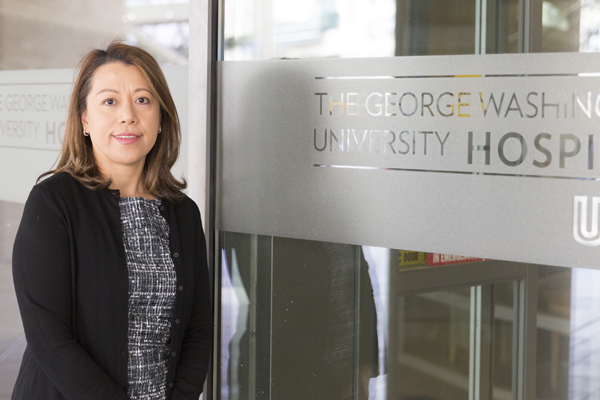Hazel Darisse
DNP, RN, CNOR Divisional Director, Surgical Services
The George Washington University Hospital
Through 27 years of progressive success in the acute care nursing management and perioperative nursing fields, Hazel Darisse, DNP ’13, has developed the leadership and management expertise necessary to build strong nursing services in an academic health care environment.
Her perspective on nursing practice has always been driven by patient needs, and she is dedicated to educating the next generation of nurse leaders to navigate the shifting landscape of the health care industry. Dr. Darisse currently serves as the interim chief nursing officer (CNO) for the George Washington University Hospital, a position she also held in 2013.
GWN: You’ve had a very successful career at GW Hospital, beginning as a staff nurse on a medical/surgical unit and progressing to your current position. What do you consider to be the highlights and greatest accomplishments of that GW career?
HD: I started my nursing career at GW Hospital in 1990 as a newly graduated floor nurse and soon transitioned to the operating room (OR), where my passion has been ever since. Open-heart surgery is where I thrived. I was the open-heart coordinator and took a couple of trips to Egypt to share our techniques with the nurses and surgeons there. I also led and worked with teams that increased on-time surgical first-case starts from 30 percent to 88 percent and reduced OR turnover time to 29 minutes [rated best in class], and implemented the kidney transplant and the robotic thoracic programs in the OR. Over a span of four years, I was part of a team overseeing the design and construction of four operating rooms that came in under budget with minimal downtime on the daily operating room schedule.
GWN: What drew you to the field of surgical nursing?
HD: I like structure and discipline. Surgery and the operating room environment is just that. Surgeons are precise and organized; traits that I respect when it comes to safe patient care.
GWN: You’ve earned a MSN and a DNP from GW Nursing. How has that education helped advance your career?
HD: My advanced degrees helped widen my vision on how to grow the next generation of nurses. They provided opportunities to acquire the resources and skills needed to function at a higher level in the organization.
GWN: Throughout your career, you’ve been closely involved in nursing education. What do you see as your successes?
HD: I’m especially proud of creating educational opportunities and supporting learning for all nurses, and particularly GW nurses! The three-credit hour perioperative curriculum that GW Nursing and I collaborated on provided a resource to backfill the nationwide shortage of OR nurses, while compressing the OR internship for qualified GW Nursing graduates to fill open positions sooner. I also developed a training protocol for a surgical first assistant program and sponsored the first licensed surgical first assistant in Washington, D.C.
GWN: What are your next career steps?
HD: I want to establish an organized mentorship for new nurses by setting up a professional pathway that will strengthen the skills they will need to achieve their goals. I learned from trial and error on my own professional path, and I wish to minimize this for our young nurses.
GWN: What advice do you have for nursing students and others who want to follow in your footsteps?
HD: You should have strong clinical experience on the front line for a minimum of five years. This will make you a better leader. Be a role model as leader. Staff are always watching, and they expect their leader to set a good example. And if you find your passion in nursing, success will follow. It was never my intention to be in a leadership position, but my passion for surgical nursing was deep and directed a professional path toward patient-centered care, staff engagement and career advancement


